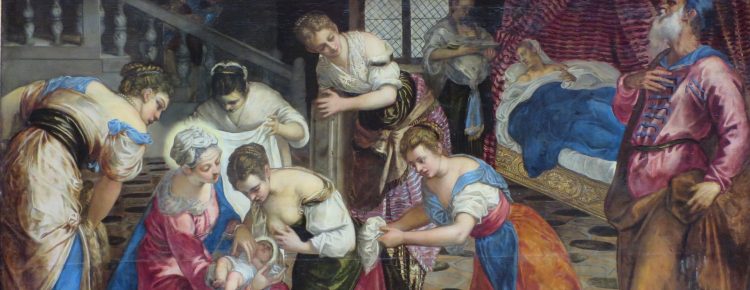Today is the day the Church celebrates the birth of John the Baptist.
And at Jesus’ baptism, John heralds him as the ‘Lamb of God who takes away the sin of the world’. The story of John’s birth is full of drama – his mother, Elizabeth was beyond childbearing age, his priestly father was struck dumb for doubting the message from the Archangel Gabriel that his wife would bear a child, and there was a bit of a fuss about the child’s name because everyone expected that he would be named Zechariah after his father. Zechariah himself regained his speech only just in time to insist that the child was to be called Johannes – or John, as we know him – meaning God is Gracious.
Part of the plan revealed by Gabriel was that the child was set aside for God’s work, being filled with the Spirit even before his birth: this is most unusual – the Old Testament prophets were all anointed by the Spirit later in life. There is a sense of great things stirring – God moving in the world – a special and important time is being heralded.
John did indeed turn out to be a remarkable figure. John lived out in the wilderness and proclaimed ‘the way of the Lord’ – calling people to repentance in preparation for the arrival of the Messiah. I love the icons of him, with wild hair and rough clothes, always looking rather as if he’s been dragged through a hedge backwards. Famously, he’s often portrayed with two heads – one where it should be and the the other on a plate signifying his sticky end at the hands of Herod.
Interestingly his spat with Herod is the only recorded instance of John having accusing an individual for their sins – pointing the finger, so to speak – Herod had taken his brother’s wife for himself. The main pattern of John’s call to repentance takes a different form – he calls people to change their lives because the Messiah is here – Jesus is around. So this repentance is in response to the great acts of God which I’ve already mentioned. Something’s divine afoot, and we need to be ready. This message, John proclaimed with great urgency – it is possible that he was a member of an ascetic and messianic community at Qumran, out in the desert in what is now the West Bank, the place where the Dead Sea Scrolls were found in the 1940s.
John did point the finger, but apart from this isolated instance with Herod, John pointed his finger to Jesus the Messiah, rather than at people for their misdeeds. His call to repentance was in response to God, in response to Jesus the Messiah, the Saviour.
The direction John’s finger was pointing in is an important object lesson for us; because we too are called to point towards Jesus. Christians have, all too often, pointed the finger at individuals because of their sins, forgetting that it’s actually God’s job to judge, not ours. We’re good, too, at pointing our fingers at ourselves – our interest in power, influence, status means that we have to draw attention to ourselves – ‘see how good I am – how talented, how remarkable.’
Both these finger pointing exercises are example of how easy it is to point our fingers in the wrong direction. LIke John, our fingers should be pointing to Jesus, the one who came to show us God’s love. So repentance becomes a response to the love we find, and our gifts come to be known as just that – if we are gifted, then God our creator is the giver of the gifts. John shows us that there’s no need to point the finger either at others in judgement, or at ourselves in a desire for power and status. Like John, we are ourselves witnesses to God’s ever dawning love.
I think there is possibly an important ‘yes but’ in all this. And that is that Jesus himself seldom pointed the finger at individuals – remember ‘whoever has no sin can throw the first stone’ – but he did condemn corrupt institutions, particularly religious institutions that had become self serving and exclusive – places where there was plenty of finger pointing going on, you might say.
This is the source of the great Christian tradition of resistance to and criticism of systems of injustice, hatred and violence. It is notable how often the church gets this wrong – we give the impression that we’re much more interested in the sins of individuals than of institutions. We speak much more loudly against personal sins than we do about collective ones. We’re lucky in Blackburn Diocese to have Bishop Philip who speaks out about poverty and injustice, but when did you last hear anything from a Christian church about the plastics that are killing our oceans, for instance.
So with John, it’s all about his fingers. Which direction will yours point?
Rev’d Dr. Anne Morris
Vicar St. Oswald’s, Knuzden
With thanks to The Rev. Mark Buetow for some of the ideas in this sermon: https://higherthings.org/

